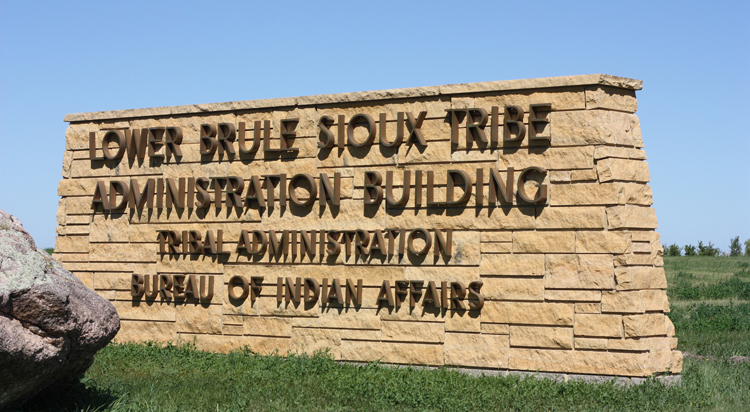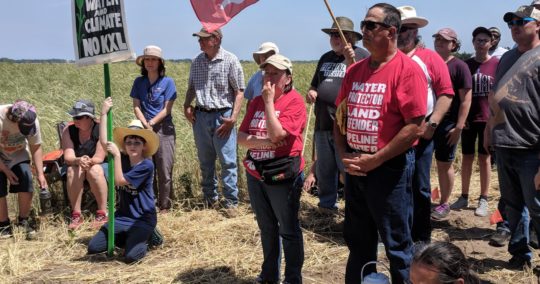

The Lower Brule Sioux Tribe announced on April 29, 2015 that it has formally invoked the “Bad Man” clause of its 1868 Fort Laramie Treaty with the U.S. government, and is calling for the immediate removal of TransCanada from the aboriginal and territorial boundaries of The Great Sioux Nation — which encompasses roughly 40% of the land that constitutes the state of South Dakota.
This would directly affect the proposed Keystone XL pipeline route and access to transmission lines. TransCanada and the state of South Dakota need the Lower Brule tribe on board, because the transmission lines needed to carry energy to the pipeline to operate would cross their land.
FOR IMMEDIATE RELEASE: April 29, 2015
Contact: Robby Her Many Horses, (605) 730-1192, robbiehmh@gmail.com
Lower Brule Sioux Tribe Rejects Keystone XL,
Calls for Immediate Removal of TransCanada from South Dakota
Lower Brule, SD – The Lower Brule Sioux Tribe announced today that it is celebrating the 147th anniversary of the signing of the 1868 Fort Laramie Treaty by rejecting Keystone XL. The Tribe is calling for the immediate removal of TransCanada from the aboriginal and territorial treaty boundaries of the Oceti Sakowin, also known as The Great Sioux Nation. The tribe is making this demand in direct response to the unethical business practices that TransCanada has demonstrated over the last six years. The tribe made it clear that they are invoking their rights under article one of the 1868 Fort Laramie Treaty, which states:
From this day forward all war between the parties to this agreement shall forever cease. The government of the United States desires peace, and its honor is hereby pledged to keep it. The Indians desire peace, and they now pledge their honor to maintain it. If bad men among the whites, or among other people subject to the authority of the United States, shall commit any wrong upon the person or property of the Indians, the United States will, upon proof made to the agent, and forwarded to the Commissioner of Indian Affairs at Washington city, proceed at once to cause the offender to be arrested and punished according to the laws of the United States, and also reimburse the injured person for the loss sustained.
Invoking the “Bad Man” clause of the treaty means roughly 40% of South Dakota is off limits to TransCanada. This would directly affect the proposed Keystone XL pipeline route and the access to transmission lines.
Acting chairman Kevin Wright of the Lower Brule Sioux Tribe said:
“As descendants of the people of this land we have witnessed destruction of many magnitudes. We are concerned for our land, water, and most importantly not only the physical wellbeing of our people but spiritual wellbeing as well. I am first a human being, not a politician, when it comes to these matters. I believe in protecting our people and look to more ecological ways of living.”
“It is not an option to bargain with our grandchildren’s future so we can live comfortably today. After much research into this Keystone XL pipeline and hearing firsthand accounts and many disheartening stories from Canadian First Nations, we feel a need to stand in support of our northern relatives. Our First Nations relatives have been fighting to end these atrocities. This pipeline and tar sands extraction has brought death, devastation, and destruction to their homelands. The children and women of the First Nations have felt the true effects from this pipeline. It is because of what we have seen happen to the north that we know that TransCanada will bring the same atrocities here to our homelands. Corporations like TransCanada are attempting to cross treaty lands and we are not going support this. We see them as ‘Bad Men’ as defined by our treaties with the United States government. We feel that TransCanada (these bad men) needs to be removed from our aboriginal and treaty territory.”
The tribe cited their statement in solidarity with the strong stance that the other members of the Oceti Sakowin have taken in response to the threat that Keystone XL poses to the safety and wellbeing of their nations. The tribe also stated that the South Dakota Public Utility Commission hearings are an attempt to diminish tribal sovereignty. The Oceti Sakowin has a unique government-to-government relationship with the United States under the 1868 Fort Laramie Treaty. Because of this relationship between the Oceti Sakowin and the United States, the Department of Interior and State Department should have consulted with the Oceti Sakowin when TransCanada first proposed the project.
In February 2015, Department of the Interior Secretary Jewell stated that she would make sure tribes were provided a platform to address issues relating to Keystone XL. Since that time the Department of Interior has denied meeting with South Dakota Tribal Nations regarding this issue.
President Wright added, “We all have rights as indigenous peoples and demand that we be heard. This land is all we have and we are obligated to preserving it for our future generations. We are encouraged by Presidents Obama’s strong stance on climate change and his recent statements supporting our indigenous youth. President Obama, it would be a great honor to have you stand alongside the Oceti Sakowin on May 8th and once and for all reject Keystone XL.”
Link to the Treaty:
http://www.archives.gov/education/lessons/sioux-treaty/images/sioux-treaty-1.jpg
# # #



